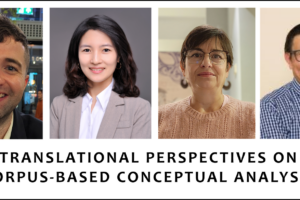Translational Perspectives on Corpus-based Conceptual Analysis

A webinar organized by the Genealogies of Knowledge Research Network in collaboration with the University of Oslo’s SHE Corpus team
- Date: 26 March 20
- Time: 12:00-15:40 (UTC)
- Venue: Online
- Speakers: Dr Michael Livesey (Sheffield), Dr Kyunghye Kim (Dongguk), Dr Gabriela Saldanha (Oslo), Prof. Qing Cao (Durham)
- Event website: https://genealogiesofknowledge.net/research-network-events/translational-perspectives/
- Registration link: https://nettskjema.no/a/477242 [nettskjema.no]
About the event
There is now a vast literature on the history of knowledge in a variety of disciplines and on the study of concepts and conceptual change, primarily in the field of international relations (see, for example, Koselleck 2006 on crisis; den Boer 2005 on civilization). Conceptual historians like Koselleck study how concepts evolve and acquire different meanings in different temporal and cultural domains, focusing particularly on socially contested concepts. Concepts such as democracy and evidence are cases in point. Little of this influential literature on the evolution and circulation of concepts has addressed the key issue of how concepts travel across cultural and linguistic spaces and how they acquire new meanings on that journey. Although the study of such concepts lends itself readily to corpus analysis, moreover, very little work has drawn on electronic corpora to study the evolution and contestation of key concepts in society. The corpus-based methodology developed as part of the Genealogies of Knowledge research project (2016-2020) for the study of the evolution and mediation of key concepts in society is currently being adapted and further developed by the Genealogies of Knowledge Research Network, in collaboration with the University of Oslo SHE Corpus team, in the field of healthcare and sustainability studies (Buts et al. 2021; Saldanha 2024).
What does conceptual analysis involve? How does it differ from traditional linguistic analyses of grammatical structures, collocational patterns, metaphor, semantic prosodies? How do we distinguish key concepts in a given domain from other lexical items that populate the frequency lists of a thematic corpus? What methods and theoretical frameworks allow us to capture connected and overlapping constellations of concepts rather than analysing individual concepts in isolation? How does translation (in its various meanings) fit into the landscape of conceptual analysis?
In line with the remit of the Genealogies of Knowledge Research Network, this event aims to stimulate interest in corpus-based conceptual analysis, with particular attention to translation and other forms of mediation. It will provide a forum for researchers engaged in different types of conceptual analysis to share some of their experiences and methodologies, and to reflect on how to extend corpus methodologies beyond the immediate focus on linguistic features per se.
Speakers
This webinar will feature contributions by Dr Michael Livesey (Sheffield), who will introduce an innovative theoretical and methodological approach to corpus-based conceptual analysis. This will then be complemented with three presentations by Dr Kyunghye Kim, Dr Gabriela Saldanha (Oslo) and Prof. Qing Cao (Durham), who will showcase how corpora can be used to explore the role of translation in the evolution and circulation of concepts across cultural and linguistic spaces.
The full programme with speaker bios and presentation abstracts can be found on our website:https://genealogiesofknowledge.net/research-network-events/translational-perspectives/.
Registration
Please register in advance by completing the form via the following link:https://nettskjema.no/a/477242 [nettskjema.no]
A Zoom link will be sent to all registered participants shortly before the webinar.
We look forward to seeing many of you there!
—-
Prof. Mona Baker, Dr Jan Buts and Dr Henry Jones
Co-coordinators of the Genealogies of Knowledge Research Network